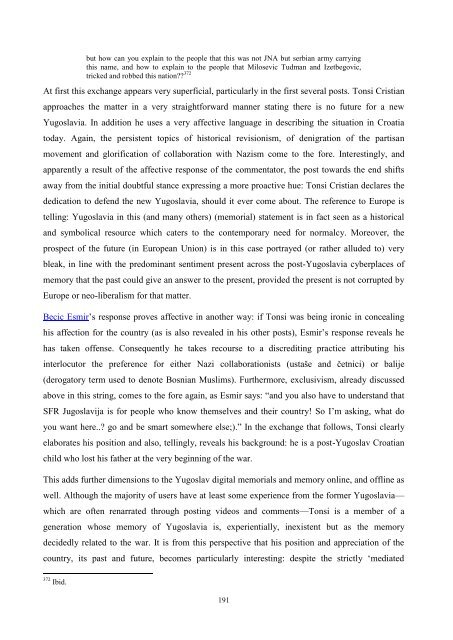UNIVERSITY OF NOVA GORICA GRADUATE SCHOOL ...
UNIVERSITY OF NOVA GORICA GRADUATE SCHOOL ...
UNIVERSITY OF NOVA GORICA GRADUATE SCHOOL ...
Create successful ePaper yourself
Turn your PDF publications into a flip-book with our unique Google optimized e-Paper software.
ut how can you explain to the people that this was not JNA but serbian army carrying<br />
this name, and how to explain to the people that Milosevic Tudman and Izetbegovic,<br />
tricked and robbed this nation?? 372<br />
At first this exchange appears very superficial, particularly in the first several posts. Tonsi Cristian<br />
approaches the matter in a very straightforward manner stating there is no future for a new<br />
Yugoslavia. In addition he uses a very affective language in describing the situation in Croatia<br />
today. Again, the persistent topics of historical revisionism, of denigration of the partisan<br />
movement and glorification of collaboration with Nazism come to the fore. Interestingly, and<br />
apparently a result of the affective response of the commentator, the post towards the end shifts<br />
away from the initial doubtful stance expressing a more proactive hue: Tonsi Cristian declares the<br />
dedication to defend the new Yugoslavia, should it ever come about. The reference to Europe is<br />
telling: Yugoslavia in this (and many others) (memorial) statement is in fact seen as a historical<br />
and symbolical resource which caters to the contemporary need for normalcy. Moreover, the<br />
prospect of the future (in European Union) is in this case portrayed (or rather alluded to) very<br />
bleak, in line with the predominant sentiment present across the post-Yugoslavia cyberplaces of<br />
memory that the past could give an answer to the present, provided the present is not corrupted by<br />
Europe or neo-liberalism for that matter.<br />
Becic Esmir‘s response proves affective in another way: if Tonsi was being ironic in concealing<br />
his affection for the country (as is also revealed in his other posts), Esmir‘s response reveals he<br />
has taken offense. Consequently he takes recourse to a discrediting practice attributing his<br />
interlocutor the preference for either Nazi collaborationists (ustaše and ĉetnici) or balije<br />
(derogatory term used to denote Bosnian Muslims). Furthermore, exclusivism, already discussed<br />
above in this string, comes to the fore again, as Esmir says: ―and you also have to understand that<br />
SFR Jugoslavija is for people who know themselves and their country! So I‘m asking, what do<br />
you want here..? go and be smart somewhere else;).‖ In the exchange that follows, Tonsi clearly<br />
elaborates his position and also, tellingly, reveals his background: he is a post-Yugoslav Croatian<br />
child who lost his father at the very beginning of the war.<br />
This adds further dimensions to the Yugoslav digital memorials and memory online, and offline as<br />
well. Although the majority of users have at least some experience from the former Yugoslavia—<br />
which are often renarrated through posting videos and comments—Tonsi is a member of a<br />
generation whose memory of Yugoslavia is, experientially, inexistent but as the memory<br />
decidedly related to the war. It is from this perspective that his position and appreciation of the<br />
country, its past and future, becomes particularly interesting: despite the strictly ‗mediated<br />
372 Ibid.<br />
191

















